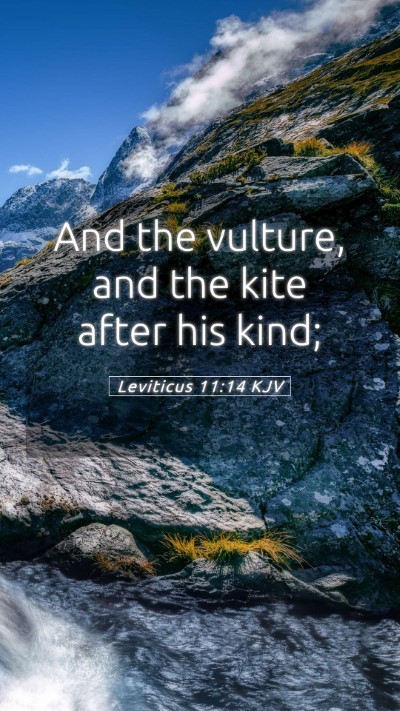Meaning and Interpretation of Leviticus 11:14
Leviticus 11:14 states, "And the owl, and the night hawk, and the cuckoo, and the hawk after his kind." This verse is part of a larger section of Scripture that outlines the dietary laws given to the Israelites, detailing various animals that they were forbidden to eat. Understanding this verse involves a look at the cultural, historical, and spiritual context in which it was penned.
Bible Verse Meanings
This verse is significant in the realm of Bible verse meanings as it reflects God's instructions regarding clean and unclean animals. The dietary restrictions served various purposes, including health benefits, symbolizing spiritual purity, and distinguishing the Israelites from surrounding nations.
Bible Verse Interpretations
- Matthew Henry's Commentary: Henry emphasizes that these laws were intended to teach the Israelites to distinguish between holy and unholy, urging them to remain separate from the unclean practices of other nations.
- Albert Barnes' Notes: Barnes interprets the mention of specific birds as a directive to avoid certain birds of prey, which may symbolize moral and spiritual corruption, encouraging adherence to God's commands.
- Adam Clarke's Exposition: Clarke provides insight into the characteristics of the birds mentioned, emphasizing their nocturnal behavior and unclean nature, serving as a metaphor for spiritual vigilance and purity.
Understanding Scripture
Understanding Leviticus 11:14 requires knowledge of the historical context of Bible verses. The Israelites were called to be a holy people, set apart for God's purposes. The dietary laws not only regulated physical health but also reinforced the need for spiritual purity and obedience to God.
Bible Verse Explanations
This passage's bible verse explanation reveals how God’s commands often go beyond mere obligations; they are bestowed with purpose. As believers today, we explore how Old Testament laws inform our spiritual lives, despite some not being applicable in the same stringent manner.
In-Depth Bible Verse Analysis
In the bible study insights derived from this verse, one can discern the importance of following God's ways. Each delineated animal has its purpose in illustrating moral lessons related to obedience, separation from sin, and the pursuit of holiness.
Application of Bible Verses to Daily Life
The careful study of verses such as Leviticus 11:14 aids in applying biblical principles to daily life. We learn that just as the Israelites were called to discern clean from unclean, we too must discern what aligns with God’s will in our lives.
Cross References
- Deuteronomy 14:12-18 - Additional laws on unclean animals.
- Isaiah 66:17 - A mention of the consequences of eating unclean things.
- 1 Timothy 4:4-5 - The New Testament perspective on clean and unclean foods.
Conclusion
In conclusion, Leviticus 11:14 serves as a crucial verse in understanding not only the dietary laws of ancient Israel but also encapsulates broader themes of holiness, separation from sin, and the importance of obeying God's commandments. The lessons drawn from this verse foster a deeper appreciation for Scripture and its application in contemporary Christian life, answering essential questions about what does this Bible verse mean and the significance of this passage.


